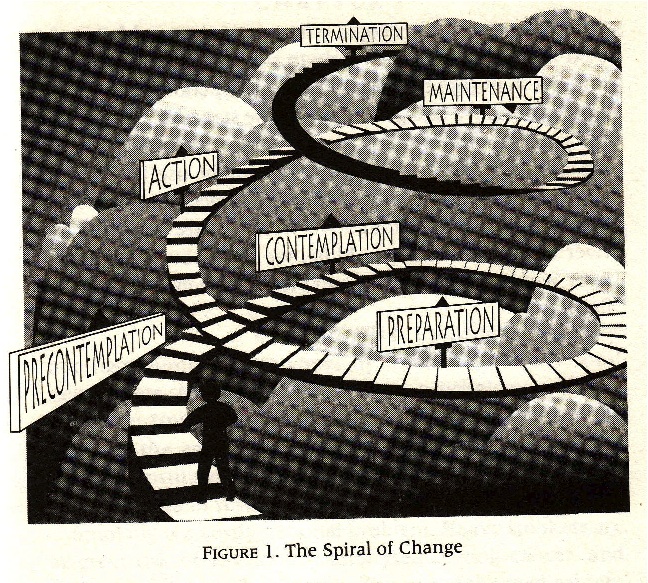How to Help an Addict in Denial
Do you know someone who seems to be in denial that they have a problem?

Maybe they are on the slippery slope towards being an alcoholic or drug addict, or eating too much junk food, and their habit is interfering with their job or school.
You probably are extremely worried about them, and you might feel exasperated, frustrated and overwhelmed by the problem.
This is one of the most difficult problems people face in relationships, and can be a considerable source of tension for families.
What can you do?
Implicit in this question is:
How can I inspire my loved one to want to change?
Understanding successful behavior change:
First we need to understand what it takes to successfully change a behavior. Prochaska, Norcross, Diclemente have done extensive research on the subject of behavior change. They state in the book Changing for Good, that we go through 6 stages of change:
Precontemplation->Contemplation->Preparation->Action->Maintenance->Termination.
We need to note 2 things about this:
1. To go from no action to action, there are 4 stages one must go through. To get to a stage where a habit becomes a part of who they are, takes 6 stages.
2. The stages of change are not linear, but spiral. People often get discouraged and frustrated, but the spiral is often upwards towards change:
The Precontemplation (in denial phase):
In this framework, if your loved one is in denial about their behavior, or defending their rights to defeat themselves, they are in the precontemplation stage.
Why do they refuse to admit they have a problem?
Because it feels safe. They don’t have to struggle, they can’t fail. There’s no guilt. They can revel in bad behavior. And often there’s no social pressure to change.
But waiting for them to bottom out can be dangerous.
Research shows consistently that the longer people wait to change, the more difficult the change becomes.
Often they will remain trapped in their patterns or spiral downwards.
If they feel like noone cares, or it doesn’t matter what they do, then they have no incentive to change.
That is why it’s essential to show your concern.
How you can help them:
- ) Raise their consciousness.
Point out behaviors (be very specific and objective) that concern you. Do not generalize, evaluate or judge.
Note the difference in a specific and objective observation:
“Buddy, I’ve noticed you’ve are on your 6th beer.”
Vs: subjective evaluation:
“Buddy, you drink too much”. Or “Buddy, you are always drinking.”, or worse, Buddy, I think you are an alcoholic or drug addict”.
It’s much harder to stay in denial when the observation feels objective.
If it feels biased or like a judgement, it will not be well received.
2.) Do as much research as you can to understand the problem.
3.) Express your concern and show them why you are concerned.
If they deny, rationalize or intellectualize the problem away:
1. ) Recognize that denial is a part of their illness.
Alcoholism, drug addiction and other addictions interfere with your frontal lobe functioning. This impairs your ability to think rationally about the subject. Keep in mind that if your loved on is college age or younger, their frontal lobes are still not fully developed!
2. ) Dont’ let yourself be convinced by their denials or intellectualization or rationalizations.
3. ) Acknowledge that they may not be concerned, but that you are, and you need their help to let go of your worry.
You might say, “Look, I’m really concerned about these specific behaviors. You could be right that I might be overreacting. But I don’t know that, and in the meantime, I’m very worried about you. I’m wondering if you’d be willing to help me relieve my anxiety. It’s important for me to know if you need help. Would you be willing to go to the doctor/take an objective assessment?”
In order for this to be effective, you must keep in mind:
1.) Make sure you can come from a place of compassion and care. Otherwise, your friend or loved one will probably detect ulterior motives. Regardless of whether or not your reasons are for his/her own good, it they sense judgement, it will backfire.
If you have any tension in your relationship, I strongly recommend checking out non-violent communication (NVC). It teaches you how to transform any relationship through compassionate communication.
For more on NVC, I highly recommend:
Marshall Rosenberg’s book: Nonviolent Communication: A Language of Life:
Look for NVC practice groups online and locally.
2.) It can be tough to have the patience & compassion when your own needs have not been met. To help others effectively, you must put on your oxygen mask first.
If your own lifestyle is out of balance or you don’t appear happy, your ability to influence others will be compromised.
3.) Seek help from family and friends, people from schools & churches to help raise consciousness and awareness about behavior. Ask them to voice their own concern. Seeking an outside mentor is another useful strategy!
4.) You might need to take a breather if things get tense, but whatever you do, DO NOT give up on your loved one.
Do you have suggestions to share about how to help a loved one in denial? Please post your comments below!





Great article! A helpful way to explain the stages and point out why it’s so important to express concern. Thank you!